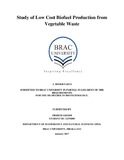Study of low cost biofuel production from vegetable waste
Abstract
The necessity of an alternate clean energy source is increasing with the elevating energy demand of modern age. Microbial production of bioethanol can be the requirement of a substitute clean energy source is accumulative with the elevating energy demand of modern age. Microbial production of bioethanol can exchange the conventional fossil fuel with green energy. In this study, local yeast isolates were used for the manufacture of bioethanol using cellulosic vegetable wastes as substrate. This project was aimed for the resourceful bioconversion of lignocellulosic biomass into ethanol by microbial action. Wild-type yeasts isolated from sugarcane juice (SC.t), date juice (DJ.t) and grape juice (GRP.t) were used as the ethanol producing organism. Very low-priced and easily available raw materials (vegetable peel, cellulosic wastes) were used as fermentation media. The overall objective of this project is to meet the demand for a low-priced and extremely efficient integrated anaerobic Saccharomyces spp. fermentation process to produce ethanol as an energy source directly from the insoluble lignocellulosic substrate (kitchen-waste). Fermentation was enhanced with respect to temperature, reducing sugar concentration and pH. Analysis of fermentation characteristics was performed under the different substrate and environmental conditions; it was observed that temperature of 30°C and pH 6.0 were optimum for fermentation with maximum yield of ethanol. The maximum ethanol production by yeast was 11.49% using vegetable peels (previously treated with cellulolytic bacteria) as substrate at 48 hours under shaking condition may replace the conventional fossil fuel with green energy.

